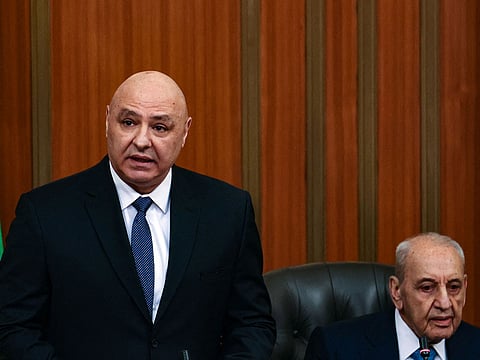Lebanon elects Joseph Aoun as President, signalling shift away from Iranian influence
His election ends more than two-year vacuum in the crisis-hit, war-battered country

BEIRUT: Lebanon elected army commander Joseph Aoun as the country’s first president in more than two years, picking a US-backed candidate in a sign of Iran’s waning influence in the region.
More than two-thirds of lawmakers voted in favour of Aoun over main rival Jihad Azour, a former finance minister who is now the International Monetary Fund’s Middle East Director.
The new president’s win ends a lengthy power vacuum and represents a pivot by Beirut toward the West, with Tehran-backed militant group Hezbollah weakened by last year’s bruising conflict with Israel.
Widely seen as the preferred pick of army backer the United States, as well as regional heavyweight Saudi Arabia, he is perceived as being best placed to maintain a fragile ceasefire and pull the country out of financial collapse.
After being sworn in at parliament, Aoun said "a new phase in Lebanon's history" was beginning.
Analysts said Aoun, who turns 61 on Friday and is considered a man of "personal integrity", was the right candidate to finally replace Michel Aoun - no relation - whose term as president ended in October 2022, without a successor until now.
Also Read: Meet Joseph Aoun, Lebanon’s new President
Aoun, who has led the army since 2017, will now be responsible for the daunting tasks of overseeing a fragile truce between Israel and Hezbollah while working on reforms to resolve a crippling economic crisis.
First, he must name a prime minister who can help him shape the nation’s future after years of crises and isolation, typified by the default on more than $30 billion of Eurobonds five years ago.
“Joseph Aoun will be able to implement the ceasefire agreement and UN Resolution 1701, two important steps toward building a state that will gain the trust of the international community,” said Najat Aoun Saliba, an independent member of parliament, referring to November’s Israel-Hezbollah accord and a 2006 agreement to maintain peace between the two sides.
“By securing the borders of Lebanon and regaining the trust in the public institutions, Lebanon can be put on the path of recovery with the help of the supporting countries like Saudi Arabia,” Saliba said.
Israel severely weakened Hezbollah during an intense offensive by air and land lasting more than two months, killing the US-designated terrorist group’s longstanding leader, Hassan Nasrallah, and depleting its weapons stockpile. That limited the ability of the organization, which is also a political party that holds significant sway in parliament, from sabotaging the electoral process.
The US backed Aoun due to its support for the Lebanese military, and envoy Amos Hochstein was in Beirut this week. Other visitors included a delegation from Saudi Arabia, the first of its kind in years, which held talks regarding the presidency.
Reforms needed
While Aoun’s election is seen by international investors and donors as a positive step, Lebanese lawmakers have in the past repeatedly failed to implement reforms demanded by the IMF to unlock billions of dollars in aid. These include repealing the banking secrecy law and implementing a comprehensive audit of the financial system.
“It all boils down to political willingness on the part of the political elites,” said Sumru Altug, an associate fellow at the Beirut-based Issam Fares Institute for Public Policy and International Affairs.
“Do they think they can muddle along for a few more years after electing a president, or are they ready to implement financial sector reform, own up to the losses in the banking sector, and agree to dismantle the cartels that allow them access to all aspects of the Lebanese economy? Improvements in investor sentiment will depend on a whole host of factors like this,” she said.



